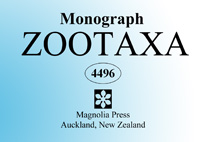Abstract
Dendrobaena byblica (Rosa, 1893) is a Circum-Mediterranean earthworm species complex containing more than a dozen synonymous names. From these, only two species have been resurrected so far, D. ganglbaueri (Rosa, 1894) and Fitzingeria annectens (Rosa, 1895). Here we demonstrate that Dendrobaena fedtschenkoi (Michaelsen, 1900) described from the Pamir Mts. Tajikistan differs from D. byblica both in morphological and molecular features, and represents an independent species.
References
Akaike, H. (1973) Information theory and an extension of the maximum likelihood principle. In: Petrov, B.N. & Csáki, F. (Eds.), Second International Symposium on Information Theory. Akadémiai Kiadó, Budapest, pp. 267–281.
Csuzdi, Cs. (2012) Earthworm species, a searchable database. Opuscula Zoologica Budapest, 43 (1), 97–99.
Folmer, O., Black, M., Hoeh, W., Lutz, R. & Vrijenhoek, R. (1994) DNA primers for amplification of mitochondrial cytochrome oxidase c subunit I from diverse metazoan invertebrates. Molecular Marine Biology and Biotechnology, 3, 294–299.
Kimura, M. (1980) A simple method for estimating evolutionary rate of base substitutions through comparative studies of nucleotide sequences. Journal of Molecular Evolution, 16, 111–120.
https://doi.org/10.1007/BF01731581Kvavadze, E. (1985) The earthworms (Lumbricidae) of the Caucasus. Metsniereba, Tbilisi, 238 pp. [in Russian]
Kvavadze, E. (1993) A new genus of earthworms Omodeoia gen. nov. (Oligochaeta, Lumbricidae). Bulletin of the Georgian Academy of Sciences, 148 (3), 129–134.
Kvavadze, E. & Nikolaishvili, K.G. (1980) Species independence of Dendrobaena schelkovnikovi and Dendrobaena hyrcanica new species of earthworm from the Hyrcan Reserve USSR. Izvestiya Akademii Nauk Gruzinskoi SSR Seriya Biologicheskaya, 6 (5), 440–447. [inn Russian]
Michaelsen, W. (1900) Die Lumbriciden-Fauna Eurasiens. Annuaire du Musée Zoologique de l'Académie Impériale des Sciences de St.-Pétersbourg, 5, 213–225.
Michaelsen, W. (1907) Die Lumbriciden des Kaukasischen Museums in Tiflis. Mitteilungen des Kaukasischen Museums, 3, 81–93.
Mršić, N. (1991) Monograph on earthworms (Lumbricidae) of the Balkans I–II. Slovenska Akademija Znanosti in Umetnosti, Ljubljana. Zazred za Naravoslovne Vede Opera, 31, 1–757.
Perel, T.S. (1967) Die Regenwürmer der Reliktwälder des westlichen Transkaukasien und des Talysch-Gebietes (Earthworms of the relict forests of Western Transcaucasia and the Talysh region). Pedobiologia, 7, 93–120. [in Russian]
Perel, T.S. (1979) Range and regularities in the distribution of earthworms of the USSR fauna. Nauka, Moscow, 272 pp. [in Russian]
Pop, V. (1949) Lumbricidele din România. Analele Academiei Republicii Populare Române Secţiunea de Ştiinţe Geologice, Geografice şi Biologie, 1 (9), 383–505.
Rambaut, A. (2012) FigTree version 1.4.0. Available from: http://tree.bio.ed.ac.uk/software/figtree/ (accessed 12 June 2018)
Ronquist, F., Teslenko, M., van der Mark, P., Ayres, D.L., Darling, A., Höhna, S., Larget, B., Liu, L., Suchard, M.A. & Huelsenbeck, J.P. (2012) MrBayes 3.2: efficient Bayesian phylogenetic inference and model choice across a large model space. Systematic Biology, 61 (3), 539–542.
https://doi.org/10.1093/sysbio/sys029Rosa, D. (1893) Viaggio del Dr. E. Festa in Palestina, nel Libano e regioni vicine. II. Lumbricidi. Bollettino dei Musei di Zoologia ed Anatomia comparata della R. Università di Torino, 8 (160), 1–14.
Rosa, D. (1894) Allolobophora Ganglbaueri ed A. Oliveirae nuove specie di Lumbricidi europei. Bollettino dei Musei di Zoologia ed Anatomia Comparata della R. Università di Torino, 9, 1–3.
Rosa, D. (1895) Nuovi lombrichi dell’Europa orientale. Bollettino dei Musei di Zoologia ed Anatomia Comparata della R. Università di Torino, 10, 1–8.
Schwarz, G.E. (1978) Estimating the dimension of a model. Annals of Statistics, 6 (2), 461–464.
https://doi.org/10.1214/aos/1176344136Szederjesi, T., Pop, V.V., Pavlíček, T., Márton, O., Krízsik, V. & Csuzdi, Cs. (2018) Integrated taxonomy reveals multiple species in the Dendrobaena byblica (Rosa, 1893) complex (Oligochaeta, Lumbricidae). Zoological Journal of the Linnean Society, 182 (3), 500–516.
https://doi.org/10.1093/zoolinnean/zlx049Tamura, K., Stecher, G., Peterson, D., Filipski, A. & Kumar, S. (2013) MEGA 6: Molecular Evolutionary Genetics Analysis Version 6.0. Molecular Biology and Evolution, 30, 2725–2729.
https://doi.org/10.1093/molbev/mst197Thompson, J.D., Higgins, D.G. & Gibson, T.J. (1994) CLUSTAL W: improving the sensitivity of progressive multiple sequence alignment through sequence weighting, position-specific gap penalties and weight matrix choice. Nucleic Acids Research, 22 (22), 4673–4680.
https://doi.org/10.1093/nar/22.22.4673Zicsi, A. (1965) Eine neue Regenwurm-Art aus Portugal (Oligochaeta: Lumbricidae). Acta Zoologica Academiae Scientiarum Hungaricae, 11, 117–225.
Zicsi, A. (1982) Verzeichnis der bis 1971 beschriebenen und revidierten Taxa der Familie Lumbricidae (Oligochaeta). Acta Zoologica Academiae Scientiarum Hungaricae, 28, 421–454.
Zicsi, A. (1991) Über die Regenwürmer Ungarns (Oligochaeta: Lumbricidae) mit Bestimmungstabellen der Arten. Opuscula Zoologica Budapest, 24, 167–191.
Zicsi, A. & Pop, V.V. (1984) Neue Regenwürmer aus Rumänien (Oligochaeta: Lumbricidae). Acta Zoologica Academiae Scientiarum Hungaricae, 30, 241–248.

